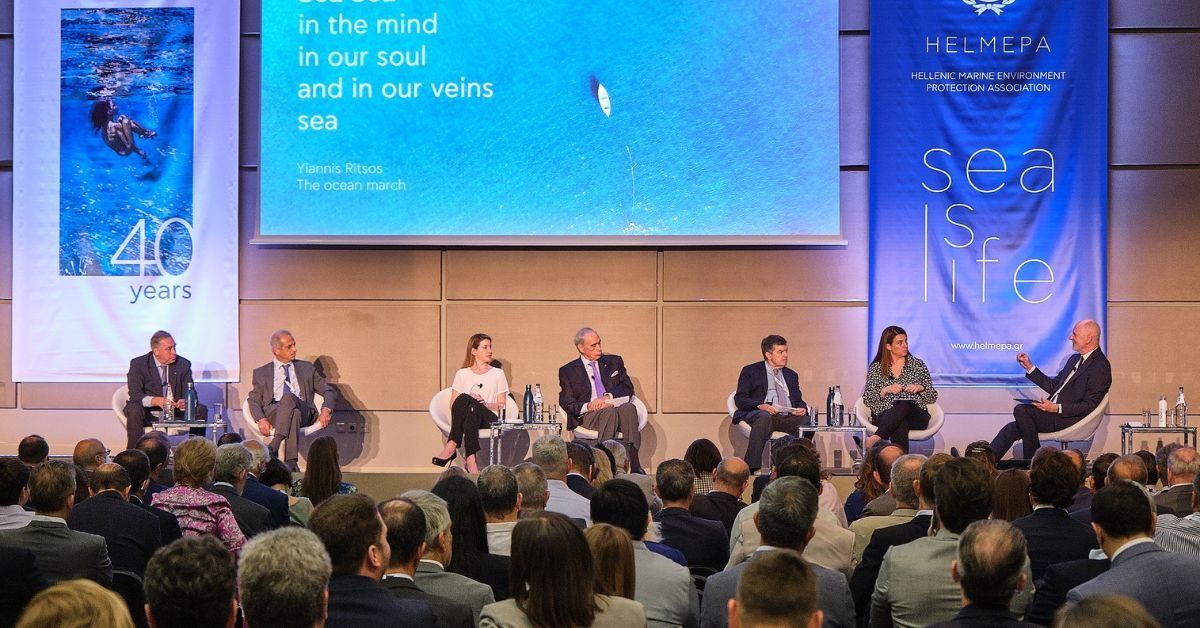POSIDONIA ATTENDANCE RECORD SOARS
Shipping is required to face the complex challenges placed by the progressively stricter IMO and EU environmental legislation and the financial issues related thereto, according to Greek Minister of Maritime Affairs and Insular Policy, Mr Ioannis Plakiotakis.
In his keynote during this morning’s opening panel of the HELMEPA Conference on the third day of this year’s Posidonia Exhibition, Plakiotakis, referred to decarbonisation as a ‘flaming issue’ and as ‘one of the biggest challenges for shipping’. “Shipping has to secure, in the very near future, worldwide availability of safe alternative low and zero carbon fuels and the related infrastructure. We are, however, still far from there.”
The Minister stressed the importance of new financial instruments and resources to fund the journey to decarbonization: “Higher standards of safety and environmental performance often come from different organizations, but always at an important financial cost. Financing of innovative solutions for the reduction of pollution from vessels and enhancement of energy efficiency of ships, including the installation of pioneering technological equipment, or the building of ships of innovative design and systems, presupposes the existence of funding mechanisms beyond the traditional ones.”
The Minister added: “The transition to a carbon-free future, requires that we gradually move from the current uncertainty to a safe environment that will be leading future investments and make sure that they result in the expected benefits for the environment, entailing a mix of targeted and flexible, private and public funding.”
He finally called on the EU and the International Maritime Research Board and Associated Fund to generously support and contribute to the required funding through sources such as the EU structural budget and other industry-led initiatives.
Addressing the audience via a prerecorded video message, Director General of the International Maritime Organisation, Kitack Lim, said: “To decarbonise a truly global industry global solutions are needed. Our goal is to ensure shipping continues to operate safely, securely, and efficiently. Our goal is to ultimately decarbonise shipping and for that, we need to collaborate between all stakeholders to develop sustainable solutions. I very much hope for your support in our endeavours. We must continue our voyage together and leave no one behind.”
In her speech, Melina Travlos, President of the Union of Greek Shipowners said: “The Union of Greek Shipowners will continue to work consistently and with dedication, in order to adopt realistic and feasible solutions that will lead our industry in this new era.”
A powerful panel of six of Greece’s biggest shipping companies, with a combined collective fleet of 354 vessels, or 7% of the total Greek-owned fleet, followed to discuss ESG issues in the shipping sector. They were: Suzanna Laskaridis, Director Laskaridis Shipping, Milena Pappas, Commercial Director, Starbulk Carriers, Athanassios Martinos, Managing Director, Eastern Mediterranean Maritime Limited, Aristidis Pittas, CEO, Euroseas & Eurodry, Simeon Palios, Director and Chairman, Diana Shipping Inc., Nikolas Tsakos, President & CEO, TEN.
Tsakos said: Greece is the Silicon Valley of shipping. We don’t want to be just the guinea pigs for any new legislation without been consulted first. The status of shipping is not yet appreciated because as an industry we are fragmented. It took a pandemic for people to start realising the importance of the industry and its contribution to world trade. We need assistance to continue reducing our footprint from 2.5-2.8 % we are today to lower levels.”
Mr Pittas said: We have been putting far too much emphasis on the E part of the ESG equation because I believe it is the easiest to tackle. Putting too much energy on the E we may be losing on the S, especially because the first thing we should care for is society and the social inclusion for everybody. We are trying to decarbonise faster than society at large can cope with, especially in developing countries. We should not forget society and the importance of good governance principles and practices for our companies.”
The importance of decarbonisation in the agenda of shipowners was also reflected in a panel discussion hosted by BIMCO, the world’s largest direct-membership organisation for shipowners. The panel tackled the barriers to transition, it being the single most important issue facing the shipping industry on its path to decarbonisation, and discussed options for new commercial solutions and shared responsibilities between charterers and shipowners.
The event was hosted by Nikolaus H. Schues, BIMCO President Designate and featured David Loosley, BIMCO Secretary General & CEO, Lars Robert Pedersen, Deputy Secretary General, BIMCO, Eman Abdalla, Cargill Ocean Transportation, Global Operations Director, Dimitrios Patrikios, CEO Kyklades Maritime, Jerry Kalogiratos, CEO, Capital Maritime and Ioanna G. Procopiou, Managing Director, Prominence Maritime S.A. & Sea Traders S.A
Both events were fittingly held on June 8, designated by the UN as World Oceans Day.
Posidonia Exhibition organisers confirmed that yesterday (Tuesday 7 June) was the event’s best attended second day ever with a total of 5.945 visitors walking the four halls of the Metropolitan Expo Centre, which is packed with 1,948 exhibiting companies from 88 countries.
“We are delighted to see the overwhelming return of the global maritime community to the home of shipping,” said Theodore Vokos, Managing Director, Posidonia Exhibitions S.A. “This is a very special Posidonia as it is the biggest in size in our history and we are on track to making it the best attended ever.” Posidonia 2022 is organised under the auspices of the Ministry of Maritime Affairs & Insular Policy, the Union of Greek Shipowners and the Hellenic Chamber of Shipping and with the support of the Municipality of Piraeus and the Greek Shipping Co-operation Committee.







